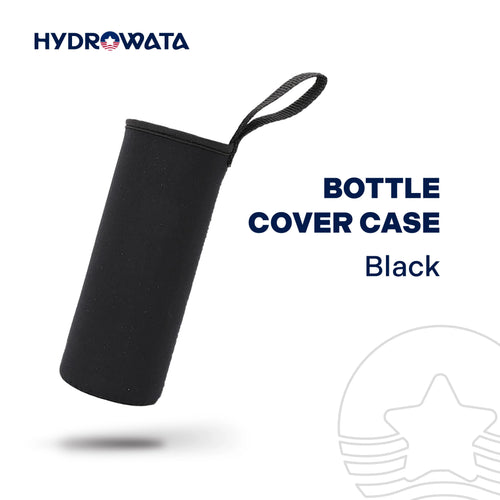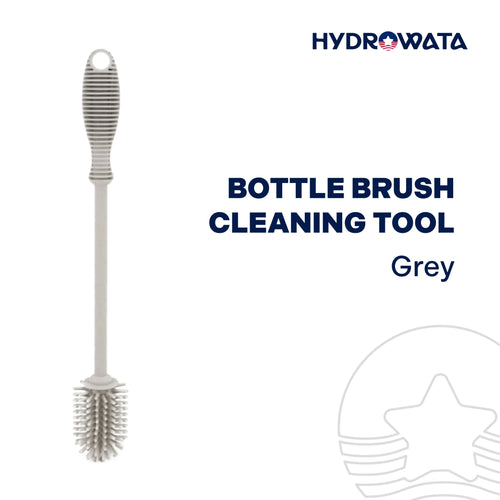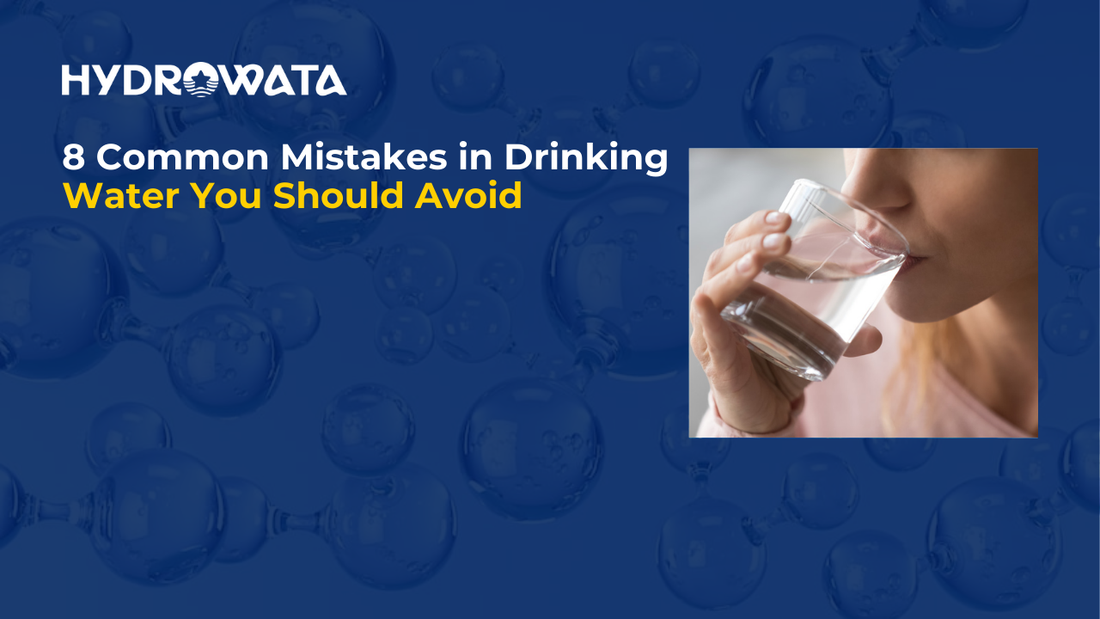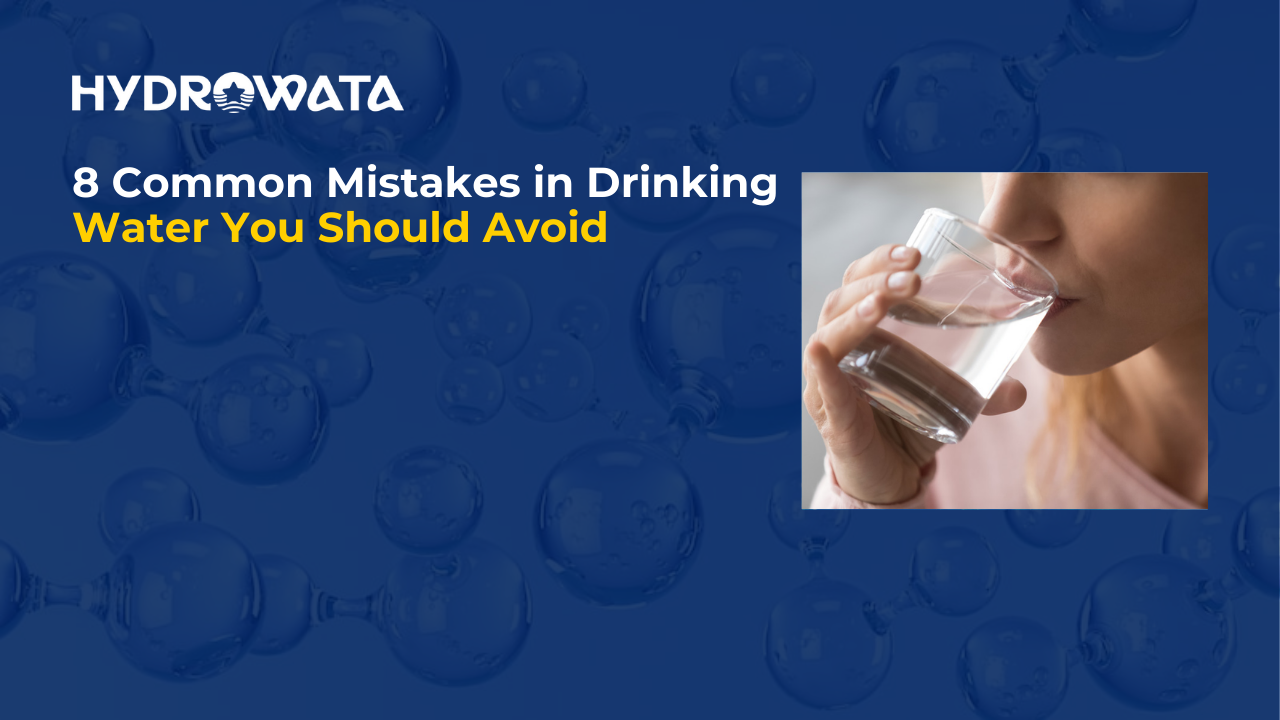Water is super important for your body. It helps your brain think, your muscles work, and keeps your skin soft. But did you know many people make mistakes when drinking water? These mistakes can leave you tired, give you headaches, or make you feel sick. In this longer guide, we’ll cover eight big mistakes people make with water—and easy fixes anyone can use. We’ll explain everything in simple words so even a 6th grader can understand. Let’s dive in!
Mistake #1: Not Drinking Enough Water

Many people go through their day without sipping enough water. You might be busy with school, work, or chores and forget to drink. By the time you feel thirsty, your body is already a bit dried out, which can make you feel tired and slow.
Why it’s a mistake:
Thirst is a late warning sign. Once you’re thirsty, you’ve already lost some of the water your body needs to work well.
How much you need:
Aim for half your body weight in ounces every day. (E.g., 100 lb → 50 oz, about 6 cups.)
Easy fixes:
- Carry a reusable bottle and sip often.
- Drink one full glass when you wake up.
- Set an hourly alarm or phone reminder.
Mistake #2: Gulping Water Too Fast

When you’re super thirsty, you might gulp down a big glass all at once. That feels good at first, but your stomach can’t hold and absorb a huge amount at one time. You may end up feeling bloated or still thirsty soon after.
Why it’s a mistake:
Fast gulps don’t let your body absorb water properly, so much of it just passes through you.
How much you need:
Take small sips—about 1–2 ounces each—and pause a few seconds before the next.
Easy fixes:
- Sip slowly instead of chugging.
- Pause between sips and let the water settle.
- During exercise, drink every few minutes, not all at once.
Mistake #3: Waiting Until You’re Thirsty

Thirst is your body’s final signal that it’s low on water. If you wait until you feel that signal, you’re already behind on hydration, which can make you tired, cranky, or give you a headache.
Why it’s a mistake:
Relying on thirst means you’re often under-hydrated, which slows down your thinking and your body.
How much you need:
Try to drink at least 4–8 ounces of water every hour, even before you feel thirsty.
Easy fixes:
- Take a few sips every hour on the clock.
- Check your pee: light yellow is good, dark means drink more.
- Up your intake on hot days or during sports.
Mistake #4: Drinking Too Much Water

It’s rare, but drinking too much water can wash out the salts and minerals your body needs. This can lead to hyponatremia, where cells swell and you feel weak, dizzy, or sick.
Why it’s a mistake:
Over-drinking dilutes the salt in your blood, which can harm your organs and make you feel ill.
How much you need:
Stick close to your daily goal (half your body weight in ounces). Only drink more if you’re sweating heavily.
Easy fixes:
- Stop when you feel comfortably full.
- After heavy sweating, add a pinch of salt or drink coconut water.
- Balance steady sips rather than forcing gallons.
Mistake #5: Ignoring Water Quality

Not all water is the same. Tap water may contain chlorine, lead, or tiny plastic bits that can upset your stomach or build up in your body over time.
Why it’s a mistake:
Contaminants in unfiltered water can cause stomach aches, headaches, or long-term health problems.
How much you need:
Filter every cup you drink. Replace your filter cartridge as the brand recommends (often every 2–3 months).
Easy fixes:
- Use a home filter like HydroWata Alkaline Charcoal Water Filter Jug.
- Boil water for 1–2 minutes if you’re unsure.
- Choose spring water from trusted labels.
Mistake #6: Drinking at the Wrong Times

Drinking a huge glass right before bed can wake you up to pee. Chugging water during meals can dilute stomach juices and slow digestion, making you uncomfortable.
Why it’s a mistake:
Poor timing can disrupt sleep, cause cramps, or slow your body’s work on food.
How much you need:
Plan for about 1 cup (8 oz) before meals, small sips during meals, 1–2 cups post-exercise, and minimal (2–4 oz) before bed.
Easy fixes:
- Drink one glass first thing in the morning.
- Have 8 oz about 20 minutes before eating.
- Sip 2–3 oz during meals.
- Take small 2–4 oz sips if you’re thirsty at night.
Mistake #7: Trusting All Bottled Water

Just because it’s in a bottle doesn’t mean it’s pure. Some brands are just repackaged tap water, and single-use plastics can leach chemicals like BPA into your drink.
Why it’s a mistake:
You pay more and may still get untreated water plus extra plastic chemicals.
How much you need:
Refill a quality reusable bottle to meet your daily ounce goal—no single-use needed.
Easy fixes:
- Switch to a stainless steel or glass bottle.
- Check the label for “spring” or “mineral” water.
- Use a home filter plus reusable bottle combo.
Mistake #8: Ignoring Hydrogen Water

Hydrogen water is simply plain water—H₂O—that has been enriched with extra molecular hydrogen (H₂) gas. Although it sounds high-tech, it’s easy to make: a small device bubbles hydrogen into your water, where it dissolves and stays until you drink it.
Once inside your body, these extra hydrogen molecules act like tiny superheroes, seeking out and neutralizing harmful free radicals that cause oxidative stress in your cells. That means fewer aches and pains after a tough workout, because hydrogen water can help reduce muscle fatigue and soreness by calming inflammation.
It can also give your brain a little boost—many people report sharper focus and clearer thinking—since it supports healthy blood flow and helps protect brain cells from everyday stressors.
Best of all, hydrogen water tastes virtually the same as regular water, so you get all these extra benefits without any strange flavor. Whether you’re an athlete looking to recover faster or someone who wants more mental energy during the day, adding a couple of cups of hydrogen-infused water to your routine can be a simple, refreshing way to support your overall health.
Why it’s a mistake:
Most people never try it, missing out on extra antioxidant benefits that plain water can’t give.
How much you need:
Include 1–2 cups of hydrogen water as part of your daily intake (within your total ounce goal).
Easy fixes:
- Use a HydroWata Hydrogen Water Bottle to make it at home in minutes.
- Carry it with you to school, practice, or work.
- Replace 1–2 cups of your regular water with hydrogen water.
Conclusion
Drinking water may seem like the easiest thing in the world, but a few simple habits can make a big difference in how well your body and mind feel every day. By sipping steadily throughout the day, choosing clean, quality water, and tuning in to your body’s true hydration needs—while avoiding both under- and over-drinking—you’ll keep your energy high, your focus sharp, and your workouts or busy school days running smoothly.
Add in a hydrogen water bottle for an extra boost, and you’ll turn plain water into a superpowered elixir that supports everything from clear thinking to healthy skin. Keep these tips in mind, and each refreshing sip will bring you closer to your healthiest, happiest self.
Frequently Asked Questions
1. Can I count juice or soda as water?
Small amounts of juice or soda can count, but they add sugar or caffeine, which can make you thirsty again.
2. What if I forget to drink water?
Keep a water bottle in your backpack or desk. Set alarms or use sticky notes as reminders.
3. Is cold or warm water better?
Both work. Cold water feels refreshing on hot days; warm water can help with digestion in the morning.
4. How do I know if my water is clean?
Taste and smell are clues. If it smells or tastes strange, use a filter or boil it first.
5. What exactly is hydrogen water?
Hydrogen water is plain water (H₂O) infused with extra hydrogen gas (H₂). Those extra hydrogen molecules act as antioxidants, helping your body fight off harmful molecules called free radicals.
6. How do I make hydrogen water at home?
You can use a hydrogen water bottle or generator—like the HydroWata Hydrogen Water Bottle—that uses a small device to infuse your tap or filtered water with hydrogen gas in just a few minutes.
7. Is hydrogen water safe to drink every day?
Yes. Studies and user reports show that daily consumption of hydrogen water is safe for most people. The hydrogen gas simply dissolves in the water and leaves no harmful byproducts.





